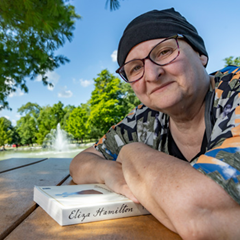Marilyn’s Story: Surviving Glioblastoma

Marilyn Tracy’s world changed in spring 2015 when she was felled by glioblastoma, an aggressive brain tumor. “I woke up one morning, and I just felt weird,” she recalled. When she looked in the mirror things appeared normal, so she went back to sleep. “When I woke up, I was having a seizure,” she said. After being hospitalized and receiving an X-ray, Tracy was transferred to Miami Valley Hospital. There, an MRI and more tests found the glioblastoma.
“I didn’t think it was that serious. I thought, ‘I am going to have an operation and they are going to take it out,’” Tracy said of the tumor. The seriousness of her condition didn’t hit home until Tracy, then 54, was home and looked up glioblastoma. “I thought, ‘Oh! This isn’t good,’” she said.
The surgery to remove the entire tumor was performed by Neurosurgeon Ania Pollock, MD. Following surgery, Tracy experienced no issues with mobility but has had some trouble with words and numbers. She said she was determined to return to her work doing taxes with H&R Block - and did. “It is hard sometimes to find the right word to say what I want to say,” she said.
Her family, including husband, Jim, and four children are what kept her going during recovery, Tracy said. Her youngest child was 11 at the time of her surgery. “My goal was to get him out of high school,” she said. He joined three older sisters this spring in becoming a Northmont High School graduate and is heading to Wright State University in the fall.
Tracy continues to have an MRI every six months and to use OptTune, a device worn on the head that sends out electromagnetic waves to keep the tumor from reforming. Although she was hesitant at first about the device, which was recommended by her radiologist in 2016, she decided to use it. The average survival rate for those with glioblastoma is 15 months. “Because of the kids, I thought it was important that I take every chance I could get,” Tracy said. “It is a fascinating piece of equipment.” The device requires patients to shave their heads and wear it as much as possible. Her goal is to use it 80 to 85 percent of the time. “I think that has also kept me going all this time. They say use it at least 75 percent of the time,” she said.
Seven years after discovering the cancer, which is often deadly, Tracy is still praising her care and follow-up. “The care was amazing. Everybody was just amazing,” she said. She credits family and friends for helping keep her spirits from deteriorating. “Everything has been good. I have a full life, have good friends. My family is wonderful. I am so grateful that I got this extra time,” Tracy said.

Contact Us
Call the Premier Health cancer hotline at (844) 316-HOPE(844) 316-4673 (4673), Monday through Friday, 8 a.m. to 5 p.m., for more information.

